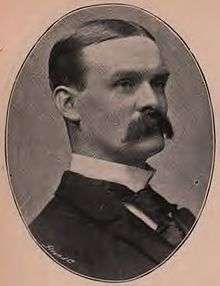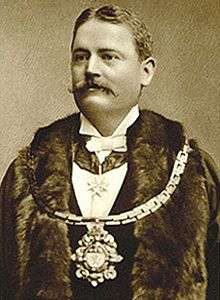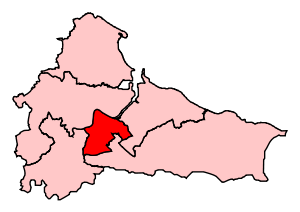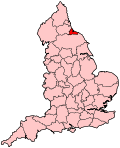Middlesbrough (UK Parliament constituency)
| Middlesbrough | |
|---|---|
|
Borough constituency for the House of Commons | |
|
Boundary of Middlesbrough in Cleveland. | |
|
Location of Cleveland within England. | |
| County | Cleveland |
| Electorate | 65,851 (December 2010)[1] |
| Current constituency | |
| Created | 1974 |
| Member of parliament | Andy McDonald (Labour) |
| Number of members | One |
| Created from | Middlesbrough East and Middlesbrough West |
| 1868–1918 | |
| Number of members | One |
| Type of constituency | Borough constituency |
| Replaced by | Middlesbrough East and Middlesbrough West |
| Created from | North Riding of Yorkshire |
| Overlaps | |
| European Parliament constituency | North East England |
Middlesbrough is a constituency[n 1] represented in the House of Commons of the UK Parliament since 2012 by Andy McDonald from Labour.[n 2]
History
Parliament created this seat under the Representation of the People Act 1867 for the general election the next year, however the population expanded so was split into east/west areas in 1918. From its second creation for the February 1974 general election, the seat has been served by an MP in the Labour Party.
The 2012 by-election result was remarkable in seeing UKIP finish second, behind the large winning Labour share of the vote which would have seen Labour ranked 17th (behind 9 Scottish seats and 8 English seats) against their results for 2010 in the 632 mainland seats.[2]
Boundaries
The boundaries of the constituency are loosely based on the pre 1968 County Borough of Middlesbrough boundaries, which is now defined as the Borough (or Town) of Middlesbrough; the exclusions are its Easterside and Park End Wards, instead in Middlesbrough South and East Cleveland.
In the Fifth Periodic Review of Westminster constituencies, the Boundary Commission's proposals were approved by Parliament that the constituency have the electoral wards:
- Acklam, Ayresome, Beckfield, Beechwood, Brookfield, Clairville, Gresham, Kader, Linthorpe, Middlehaven, North Ormesby and Brambles Farm, Pallister, Park, Thorntree, University in the Borough of Middlesbrough[3]
Constituency profile
The constituency is mostly the urban city itself, largely in the sunset of its once world-leading steel-making output, its adult population has mostly a low income with high unemployment, however with modern advanced engineering, design and tourism the city forms with nearby Redcar a bellwether for the North East region's economy firmly in the British forefront of a determined return to increasing national output.[4] In November 2012 male and female unemployment (based on the more up-to-date claimant statistics) placed Middlesbrough topmost of 29 constituencies in the region, well ahead for example the City of Durham at the bottom of the list, with just 3.4% claimants whereas this area had 9.4% claimants.[5]
In terms of housing stock, the authority is one of few authorities to see the proportion of detached and semi-detached homes increase (to 13.6% and 39.9%), in this instance this was coupled with a similar rise in flats to 11.9%, all at a loss to the share of terraced properties, down 4.7%.[6]
ToryBoy The Movie
ToryBoy The Movie is a British documentary feature film directed by and starring John Walsh. It follows Walsh as he becomes a political candidate for the Conservative Party in the north east England constituency of Middlesbrough. A staunch Labour Party supporter all his life, Walsh had become disillusioned with the party. When David Cameron opened the door to allow non-party members to run for the Conservative candidacy ahead of the 2010 General Election.[7] The claims made about Sir Stuart Bell became national news with some newspapers suggesting he may be "Britain's Laziest MP".[8] This led to further local investigation Neil Macfarlane a report for the Teesside Gazette asked "Are Teessiders getting enough from Sir Stuart Bell?" when he failed to answer over 100 telephone calls made to his consistency office, as outlined in the film.[9]
Members of Parliament
MPs 1868–1918
| Year | Member[10] | Whip | |
|---|---|---|---|
| 1868 | Henry William Ferdinand Bolckow | Liberal | |
| 1878 | Isaac Wilson | Liberal | |
| 1892 | Joseph Havelock Wilson | Liberal | |
| 1900 | Samuel Alexander Sadler | Conservative | |
| 1906 | Joseph Havelock Wilson | Liberal | |
| 1910 | Penry Williams | Liberal | |
| 1918 | constituency abolished | ||
MPs since 1974
| Election | Member[10] | Party | |
|---|---|---|---|
| Feb 1974 | Arthur Bottomley | Labour | |
| 1983 | Sir Stuart Bell | Labour | |
| 2012 by-election | Andy McDonald | Labour | |
Elections
Elections in the 2010s
| Party | Candidate | Votes | % | ± | |
|---|---|---|---|---|---|
| Labour | Andy McDonald | 18,584 | 56.8 | +10.9 | |
| UKIP | Nigel Baker | 6,107 | 18.7 | +15.0 | |
| Conservative | Simon Clarke[12] | 5,388 | 16.5 | -2.3 | |
| Green | Hannah Graham[12] | 1,407 | 4.3 | +4.3 | |
| Liberal Democrat | Richard Kilpatrick | 1,220 | 3.7 | -16.2 | |
| Majority | 12,477 | 38.1 | +12.1 | ||
| Turnout | 32,706 | ||||
| Labour hold | Swing | ||||
UKIP originally selected Ian Neil[13] but later changed to Nigel Baker.[14]
| Party | Candidate | Votes | % | ± | |
|---|---|---|---|---|---|
| Labour | Andy McDonald | 10,201 | 60.5 | +14.6 | |
| UKIP | Richard Elvin | 1,990 | 11.8 | +8.1 | |
| Liberal Democrat | George Selmer | 1,672 | 9.9 | −10.0 | |
| Conservative | Ben Houchen | 1,063 | 6.3 | −12.5 | |
| Peace | Imdad Hussain | 1,060 | 6.3 | N/A | |
| BNP | Peter Foreman | 328 | 1.9 | −3.9 | |
| TUSC | John Malcolm | 277 | 1.6 | N/A | |
| Independent | Mark Heslehurst | 275 | 1.6 | N/A | |
| Majority | 8,211 | 48.7 | +22.7 | ||
| Turnout | 16,866 | ||||
| Labour hold | Swing | ||||
| Party | Candidate | Votes | % | ± | |
|---|---|---|---|---|---|
| Labour | Sir Stuart Bell | 15,351 | 45.9 | −11.7 | |
| Liberal Democrat | Chris Foote-Wood | 6,662 | 19.9 | +1.2 | |
| Conservative | John Walsh | 6,283 | 18.8 | +2.3 | |
| Independent | Joan McTigue | 1,969 | 5.9 | +5.9 | |
| BNP | Michael Ferguson | 1,954 | 5.8 | +3.3 | |
| UKIP | Robert Parker | 1,236 | 3.7 | +1.3 | |
| Majority | 8,689 | 26.0 | |||
| Turnout | 33,455 | 51.4 | +2.7 | ||
| Labour hold | Swing | −6.4 | |||
Elections in the 2000s
| Party | Candidate | Votes | % | ± | |
|---|---|---|---|---|---|
| Labour | Sir Stuart Bell | 18,562 | 57.8 | −9.8 | |
| Liberal Democrat | Joe Michna | 5,995 | 18.7 | +8.3 | |
| Conservative | Caroline Flynn-Macleod | 5,263 | 16.4 | −2.7 | |
| BNP | Ron Armes | 819 | 2.5 | N/A | |
| UKIP | Michael Landers | 768 | 2.4 | N/A | |
| Independent | Jackie Elder | 503 | 1.6 | N/A | |
| Independent | Derrick Arnott | 230 | 0.7 | N/A | |
| Majority | 12,567 | 39.1 | |||
| Turnout | 32,140 | 48.8 | −1.0 | ||
| Labour hold | Swing | −9.0 | |||
| Party | Candidate | Votes | % | ± | |
|---|---|---|---|---|---|
| Labour | Stuart Bell | 22,783 | 67.6 | −3.9 | |
| Conservative | Alex Finn | 6,453 | 19.1 | +2.0 | |
| Liberal Democrat | Keith Miller | 3,512 | 10.4 | +1.9 | |
| Socialist Alliance | Geoffrey Kerr-Morgan | 577 | 1.7 | N/A | |
| Socialist Labour | Kai Andersen | 392 | 1.2 | N/A | |
| Majority | 16,330 | 48.5 | |||
| Turnout | 33,717 | 49.8 | −15.2 | ||
| Labour hold | Swing | ||||
Elections in the 1990s
| Party | Candidate | Votes | % | ± | |
|---|---|---|---|---|---|
| Labour | Stuart Bell | 32,925 | 71.43 | +7.3 | |
| Conservative | Liam Benham | 7,907 | 17.15 | −8.6 | |
| Liberal Democrat | Alison Charlesworth | 3,934 | 8.53 | −1.7 | |
| Referendum | Robert Edwards | 1,331 | 2.89 | N/A | |
| Majority | 25,018 | 54.27 | |||
| Turnout | 65.00 | ||||
| Labour hold | Swing | ||||
| Party | Candidate | Votes | % | ± | |
|---|---|---|---|---|---|
| Labour | Stuart Bell | 26,343 | 64.1 | +4.4 | |
| Conservative | Paul R. Rayner | 10,559 | 25.7 | +0.7 | |
| Liberal Democrat | Mrs. Rosamund Jordan | 4,201 | 10.2 | −5.1 | |
| Majority | 15,784 | 38.4 | +3.7 | ||
| Turnout | 41,103 | 69.8 | −1.1 | ||
| Labour hold | Swing | +1.9 | |||
Elections in the 1980s
| Party | Candidate | Votes | % | ± | |
|---|---|---|---|---|---|
| Labour | Stuart Bell | 25,747 | 59.70 | ||
| Conservative | Robert James Orr-Ewing | 10,789 | 25.02 | ||
| Liberal | Philip Allan Hawley | 6,594 | 15.29 | ||
| Majority | 14,958 | 36.7 | |||
| Turnout | 70.95 | ||||
| Labour hold | Swing | ||||
| Party | Candidate | Votes | % | ± | |
|---|---|---|---|---|---|
| Labour | Stuart Bell | 21,220 | 50.7 | ||
| Conservative | Mrs. L.H. Campey | 11,551 | 27.6 | ||
| Liberal | Rev. A.D. Sanders | 8,871 | 21.2 | ||
| Workers Revolutionary | M.A. Simpson | 207 | 0.5 | ||
| Majority | 9,669 | 23.1 | |||
| Turnout | 66.4 | ||||
| Labour hold | Swing | ||||
Elections in the 1970s
| Party | Candidate | Votes | % | ± | |
|---|---|---|---|---|---|
| Labour | Arthur Bottomley | 24,872 | 56.2 | ||
| Conservative | C Fenwick | 13,463 | 30.4 | ||
| Liberal | Peter Freitag | 4,023 | 9.1 | ||
| Workers Revolutionary | M Simpson | 1,018 | 2.3 | ||
| Independent Labour | J Wilcox | 861 | 2.0 | ||
| Majority | 11,409 | 25.8 | |||
| Turnout | 67.9 | ||||
| Labour hold | Swing | ||||
| Party | Candidate | Votes | % | ± | |
|---|---|---|---|---|---|
| Labour | Arthur Bottomley | 22,791 | 61.8 | ||
| Conservative | Edward Leigh | 8,984 | 24.4 | ||
| Liberal | Chris Foote Wood | 5,080 | 13.8 | ||
| Majority | 13,807 | 37.5 | |||
| Turnout | 61.2 | ||||
| Labour hold | Swing | ||||
| Party | Candidate | Votes | % | ± | |
|---|---|---|---|---|---|
| Labour | Arthur Bottomley | 27,324 | 66.3 | N/A | |
| Conservative | Geoffrey Dickens | 13,915 | 33.7 | N/A | |
| Majority | 13,409 | 32.5 | N/A | ||
| Turnout | 41,239 | 69.4 | N/A | ||
| Labour win (new seat) | |||||
General Election 1914/15:
A General Election was required to take place before the end of 1915. The political parties had been making preparations for an election to take place and by the July 1914, the following candidates had been selected;
- Liberal:Penry Williams
- Unionist:

| Party | Candidate | Votes | % | ± | |
|---|---|---|---|---|---|
| Liberal | Penry Williams | 10,313 | |||
| Conservative | Thomas Gibson Poole | 6,568 | |||
| Majority | |||||
| Turnout | |||||
| Liberal hold | Swing | ||||

| Party | Candidate | Votes | % | ± | |
|---|---|---|---|---|---|
| Liberal | Penry Williams | 9,670 | |||
| Conservative | Arthur Charles Dorman | 6,756 | |||
| Ind. Labour Party | Patrick Walls | 2,710 | |||
| Majority | |||||
| Turnout | |||||
| Liberal hold | Swing | ||||
Elections in the 1900s
| Party | Candidate | Votes | % | ± | |
|---|---|---|---|---|---|
| Lib-Lab | Joseph Havelock Wilson | 9,271 | 52.6 | +2.8 | |
| Conservative | Sir Samuel Alexander Sadler | 6,864 | 39.0 | -11.3 | |
| Independent Socialist | George Lansbury | 1,484 | 8.4 | n/a | |
| Majority | 2,407 | 13.6 | 14.0 | ||
| Turnout | 86.7 | ||||
| Lib-Lab gain from Conservative | Swing | +7.0 | |||

| Party | Candidate | Votes | % | ± | |
|---|---|---|---|---|---|
| Conservative | Samuel Alexander Sadler | 6,760 | |||
| Lib-Lab | Joseph Havelock Wilson | 6,705 | |||
| Majority | 55 | ||||
| Turnout | |||||
| Conservative gain from Lib-Lab | Swing | ||||
Elections in the 1890s

| Party | Candidate | Votes | % | ± | |
|---|---|---|---|---|---|
| Lib-Lab | Joseph Havelock Wilson | 6,755 | |||
| Conservative | Samuel Alexander Sadler | 4,735 | |||
| Majority | 2,020 | ||||
| Turnout | |||||
| Lib-Lab hold | Swing | ||||

| Party | Candidate | Votes | % | ± | |
|---|---|---|---|---|---|
| Independent Labour | Joseph Havelock Wilson | 4,691 | n/a | ||
| Liberal | William Snowdon Robson | 4,062 | n/a | ||
| Liberal Unionist | Thomas Hugh Bell | 3,333 | n/a | ||
| Majority | 629 | n/a | |||
| Turnout | n/a | ||||
| Independent Labour gain from Liberal | Swing | n/a | |||
Elections in the 1880s
| Party | Candidate | Votes | % | ± | |
|---|---|---|---|---|---|
| Liberal | Isaac Wilson | Unopposed | n/a | n/a | |
| Liberal hold | Swing | n/a | |||

| Party | Candidate | Votes | % | ± | |
|---|---|---|---|---|---|
| Liberal | Isaac Wilson | 6,961 | 63.3 | +1.6 | |
| Conservative | Raylton Dixon | 4,035 | 36.7 | +14.5 | |
| Majority | 2,926 | 26.6 | −12.9 | ||
| Turnout | 10,996 | 79.3 | |||
| Liberal hold | Swing | ||||
| Party | Candidate | Votes | % | ± | |
|---|---|---|---|---|---|
| Liberal | Isaac Wilson | 4,515 | 61.7 | −7.0 | |
| Conservative | Samuel Sadler | 1,626 | 22.2 | −9.1 | |
| Lib-Lab | E. D. Lewis | 1,171 | 16.0 | N/A | |
| Majority | 2,889 | 39.5 | |||
| Turnout | 7,312 | 68.7 | |||
| Liberal hold | Swing | ||||
Elections in the 1870s
| Party | Candidate | Votes | % | ± | |
|---|---|---|---|---|---|
| Liberal | Isaac Wilson | 5,307 | 68.7 | +9.3 | |
| Conservative | Samuel Sadler | 2,415 | 31.3 | +15.4 | |
| Majority | 2,902 | 37.6 | |||
| Turnout | 7,722 | 65.3 | N/A | ||
| Liberal hold | Swing | ||||
| Party | Candidate | Votes | % | ± | |
|---|---|---|---|---|---|
| Liberal | Henry Bolckow | 3,719 | 59.4 | N/A | |
| Lib-Lab | John Kane | 1,541 | 19.1 | N/A | |
| Conservative | W. R. J. Hopkins | 996 | 15.9 | N/A | |
| Majority | 2,178 | 34.8 | N/A | ||
| Turnout | 6,256 | 70.6 | N/A | ||
| Liberal hold | Swing | ||||
Elections in the 1860s
| Party | Candidate | Votes | % | ± | |
|---|---|---|---|---|---|
| Liberal | Henry Bolckow | Unopposed | |||
| Liberal hold | Swing | ||||
See also
Notes and references
- Notes
- ↑ A borough constituency (for the purposes of election expenses and type of returning officer)
- ↑ As with all constituencies, the constituency elects one Member of Parliament (MP) by the first past the post system of election at least every five years.
- References
- ↑ "Electorate Figures – Boundary Commission for England". 2011 Electorate Figures. Boundary Commission for England. 4 March 2011. Retrieved 13 March 2011.
- ↑ General Election Results from the Electoral Commission
- ↑ Review area – Middlesbrough Boundary Commission for England
- ↑ Constituency Profile The Guardian
- ↑ Unemployment statistics The Guardian
- ↑ 2011 census interactive maps
- ↑ http://www.telegraph.co.uk/news/politics/conservative/5377839/David-Cameron-to-open-up-candidate-list-to-everyone.html
- ↑ http://www.independent.co.uk/news/uk/politics/no-surgeries-for-14-years--is-sir-stuart-bell-britains-laziest-mp-2350953.html
- ↑ http://www.gazettelive.co.uk/news/local-news/teessiders-getting-enough-sir-stuart-3693031
- 1 2 Leigh Rayment's Historical List of MPs – Constituencies beginning with "M" (part 2)
- ↑ "Election Data 2015". Electoral Calculus. Archived from the original on 17 October 2015. Retrieved 17 October 2015.
- 1 2 "Middlesbough". YourNextMP. Retrieved 23 February 2015.
- ↑ http://www.gazettelive.co.uk/news/teesside-news/ukip-name-ian-neil-steve-7977383
- ↑ http://www.myukip.com/parliamentary-candidates-l-o.html
- ↑ "Election Data 2010". Electoral Calculus. Archived from the original on 17 October 2015. Retrieved 17 October 2015.
- ↑ "UK > England > North East > Middlesbrough". Election 2010. BBC. 7 May 2010. Retrieved 10 May 2010.
- ↑ "Election Data 2005". Electoral Calculus. Archived from the original on 15 October 2011. Retrieved 18 October 2015.
- ↑ "Election Data 2001". Electoral Calculus. Archived from the original on 15 October 2011. Retrieved 18 October 2015.
- ↑ "Election Data 1997". Electoral Calculus. Archived from the original on 15 October 2011. Retrieved 18 October 2015.
- ↑ "Election Data 1992". Electoral Calculus. Archived from the original on 15 October 2011. Retrieved 18 October 2015.
- ↑ "Politics Resources". Election 1992. Politics Resources. 9 April 1992. Retrieved 6 December 2010.
- ↑ "Election Data 1987". Electoral Calculus. Archived from the original on 15 October 2011. Retrieved 18 October 2015.
- ↑ "Election Data 1983". Electoral Calculus. Archived from the original on 15 October 2011. Retrieved 18 October 2015.
- 1 2 3 4 5 6 7 8 British Parliamentary Election Results 1885-1918, FWS Craig
- ↑ Debrett's House of Commons & Judicial Bench, 1916
- ↑ Debrett's House of Commons & Judicial Bench, 1916
- 1 2 3 4 5 6 The Liberal Year Book, 1907
- ↑ Debrett's House of Commons & Judicial Bench, 1901
- ↑ Debrett's House of Commons & Judicial Bench, 1901
- ↑ Debrett's House of Commons & Judicial Bench, 1886
Sources
- Craig, F. W. S. (1989) [1977]. British parliamentary election results 1832–1885 (2nd ed.). Chichester: Parliamentary Research Services. ISBN 0-900178-26-4.
- Craig, F. W. S. (1989) [1974]. British parliamentary election results 1885–1918 (2nd ed.). Chichester: Parliamentary Research Services. ISBN 0-900178-27-2.

